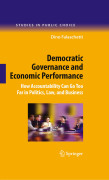
Democratic governance and economic performance: how accountability can go too far in politics, law, and business
Falaschetti, D.
Conventional wisdom warns that unaccountable political and business agents can enrich a few at the expense of many. But logically extending this wisdom implies that associated principals – voters, consumers, shareholders – will favorthemselves over the greater good when ‘rules of the game’ instead create too much accountability. This book rigorously develops this hypothesis, and finds statistical evidence and case study illustrations that democratic institutionsat various governance levels (e.g., federal, state, corporation) have facilitated opportunistic gains for electoral, consumer, and shareholder principals. To be sure, this conclusion does not dismiss the potential for democratic governance to productively reduce agency costs. Rather, it suggests that policy makers, lawyers, and managers can improve governance by weighing the agency benefits of increased accountability against the distributional costs of favoring principal stakeholders over more general economic opportunities. Challenges conventional wisdom about the benefits of democratic governance in organizationsProvides evidence how ‘democracy can go too far’ and thus decrease economic performance Applies theory to macro-governance level (monetary, fiscal, and trade policy), intermediate-level of governance (antitrust laws and competition policies) and the micro-level (corporate governance) INDICE: Introduction.- Theory.- A Quasi-Experimental Setting.- EconometricEvidence.- Democracy.- Competition Policy.- Corporate Governance.- Conclusion.
- ISBN: 978-0-387-78706-0
- Editorial: Springer
- Encuadernacion: Cartoné
- Páginas: 185
- Fecha Publicación: 01/07/2009
- Nº Volúmenes: 1
- Idioma: Inglés
